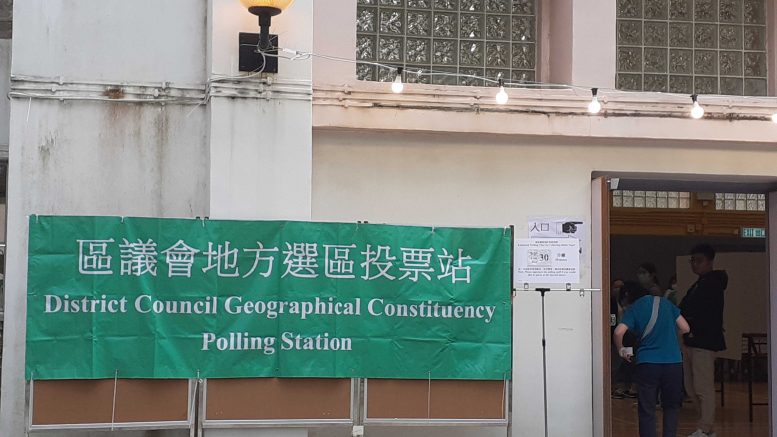By Chris Yeung
Billed as an epoch-making election, the 2023 District Council election held in Hong Kong on Sunday (10/12) ended with a two-folded failure.
First, an unprecedented campaign launched by the Government to call on voters to cast a vote failed miserably as voters shunned the ballot boxes, staging a silent protest against the authorities and the revamped election system. The turnout rate of the December 10 election hit a record low, or 27.42 per cent. About 1.19 million people cast their ballots.
The dismal turnout poured ice water onto the heads of the team led by Chief Executive John Lee, who had pulled out all stops to lure voters to cast a vote in the election, which they say will help improve governance at district level and “build a better community.”
Adding more embarrassment to Lee, a multi-million-dollar computer system broke down about three hours before voting was scheduled to end, prompting the election watchdog to extend voting time by 90 minutes.
Not surprisingly, pro-establishment figures lost no time to play a blame game, shifting the focus from the embarrassing voter turnout to the technical glitch. Lee was also quick to demand a full report on the computer glitches by the Electoral Affairs Commission within three months.
EAC chairperson Justice David Lok was visibly upset by the computer failure, adding it would be okay for him if someone has to take responsibility for the incident.
Compared with the computer failure, the political fiasco of the Lee government in rallying the people together to cast their votes is far more profoundly significant.
The figures say it all. Based on the results of the 2021 Legislative Council election, the online media outlet HK01 found candidates from the pro-establishment camp have garnered a total of 1.15 million votes. The total number is about the same as the total number of people who cast their votes on Sunday.
Like elections elsewhere regardless of their game rules, the Sunday election is an occasion for the people to express their free will on the candidate they trust and, also importantly, whether or not to cast a vote.
Nearly three-quarters of registered voters have spoken out by shunning the polls for a list of probable reasons.
One is apparently the major factor; many decided not to vote as a form of protest against the electoral system and, from a broader perspective, a show of disapproval of the performance of the Lee administration in the first geographical polls held after he took power.
A low turnout also hit the Legislative Council elections in December 2021 following a revamp of its electoral arrangements aimed to implement the policy of “patriots ruling Hong Kong” in a full and comprehensive manner.
Voter turnout took a dive as pro-democracy voters cast protest votes by not voting to vent out their anger and despair over what happened in the city in 2019 and thereafter.
Two years on, most, if not all, of the pro-democracy voters remained defiant despite, or perhaps because of, the Government’s all-penetrating go-voting propaganda.
The act of defiance may be conveniently branded as “soft resistance” by the authorities that they have vowed to tackle. That a feeling of resistance and disapproval has prevailed among a large part of the populace shows the slogan of “Hong Kong now moving from stability towards prosperity” is just that: a slogan.
More than four years since the Government mishandling of the anti-extradition bill protest has worsened divisiveness and bred feud among the populace, the city is still in a state of chaos in many aspects, in particular in the sphere of politics.
Put simply, the right to participate in elections is the right to be heard. With a vote, citizens are entitled the right and the freedom to choose their representatives to speak for them at the district council and legislature.
Divergent views are heard and debated. Through the two-tier councils, differences in policies are being narrowed and conflicts eased for consensus-building on how the city should be governed.
Results of the Sunday election, both in terms of turnout and the number of votes candidates received, show a majority of the people feel the 18 district councils do not represent them, just like the current Legco. Nor they feel Lee has made an attempt to hear their voices.
Defending the carnival-like election activities, a top government official has vowed to hold a “happy election.”
The pro-Beijing flagship Democratic Alliance for the Betterment and Progress of Hong Kong has emerged as the biggest winner in the elections and probably the happiest among all. But all, including the DAB, will be the loser if the district councils create more problems than solving any of them. There will be little to feel happy with.
This article was first published on Green Bean Facebook


Be the first to comment on "Voters protest by not casting a vote"